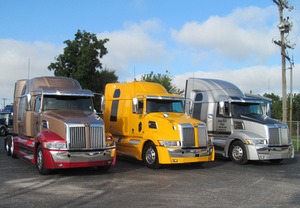Power Inverters
Topic 16386 | Page 1

I am in training with Covenant right now, but when I get out I want to set my truck up pretty well. I was wondering if I could get some advice on how to do so. I plan on using my laptop which had a 135w power supply, a small tv, thermal cooler, and a microwave if I can manage it. I can get the shop (required to have the companies shop do it actually, not do it myself) to install a power inverter up to 1000w. But I see a lot of reasonably 300w to 1000w inverters that can connect to a regular DC outlet like the ones in the truck. Anybody know what those outlets can handle?
I believe 12V truck outlets are rated 10 Amps. I know a small vacuum will pop the fuses.
Stevens Transport runs 1500w inverters hardwired into our trucks (not plugged into outlets). They will handle everything you mentioned.
The microwave is the only thing you have to worry about, as long as the TV isn't something truly ancient. My 700w microwave will immediately cause my APU to turn on to recharge the truck batteries if I activate it with the APU off.
HOS:
Hours Of Service
HOS refers to the logbook hours of service regulations.DWI:
Driving While Intoxicated
APU:
Auxiliary Power Unit
On tractor trailers, and APU is a small diesel engine that powers a heat and air conditioning unit while charging the truck's main batteries at the same time. This allows the driver to remain comfortable in the cab and have access to electric power without running the main truck engine.
Having an APU helps save money in fuel costs and saves wear and tear on the main engine, though they tend to be expensive to install and maintain. Therefore only a very small percentage of the trucks on the road today come equipped with an APU.


Awesome, thank you for the insight.
Be aware that microwave ovens are listed by their output power.
This is important because nothing is 100% efficient.
To get 700 watts out, your oven will likely require 1000 to 1200 watts in.
Check the label on your oven (usually found on the back near the point where the electric cord enters the oven). The label will list either the input power in watts, or the maximum load current in amps.
I would not recommend anything less than a 1500 watt inverter if you are planning to use a microwave or toaster oven. A smaller one may work for a while, but you will be loading it at or near its maximum capacity and perhaps beyond.
I've not read the standard that defines the voltage and current rating for the cigarette lighter plug (UL Standard 2089) but every one that I've ever encountered has been fused at 10 amps. Therefore you could calculate 120 watts nominal and 140 watts peak power output from your 12 volt outlets.
There are many other style plug and socket connectors that are much more robust than the cigar plugs. The Anderson Power Pole connectors that I use for my amateur radio equipment are rated for 45 amps. For a 12 volt DC system that's 540 watts nominal and 630 watts peak power. Of course you'd have to have a direct connection to your truck's batteries or a high current buss to achieve that.

Can the truck's electrical system not handle anything bigger than 1500 watts? I've got a 5000 watt inverter sitting in my garage, still in the box.

Can the truck's electrical system not handle anything bigger than 1500 watts? I've got a 5000 watt inverter sitting in my garage, still in the box.
I'm not sure what the maximum output from the batteries of a truck is. It probably varies by manufacturer and features. I've seen 3000 watt inverters in truck stops, I know, so I'd guess that 3000 is mountable in most trucks. I'd check with the manufacturer through a service facility before I put a 5000 watt inverter in. The wires attacked to my inverter are pretty darn thick, so I suspect the wiring can handle 5000 watts, but I'm not sure if a standard battery bank could handle it if you actually drew close to the maximum rated load.
Can the truck's electrical system not handle anything bigger than 1500 watts? I've got a 5000 watt inverter sitting in my garage, still in the box.
The short answer is maybe. Ask someone in the Covenant shop for a definitive answer. I'm certain that this is an item that, if allowed, would be required to be installed by Covenant's shop.
The long answer:
A 5000 watt inverter could potentially draw in excess of 450 amps and will therefor need to be fed with 4/0 wire. If the truck's batteries are not already wired with that size wire, you will need to rewire the entire battery box.
The battery bank is likely to have the capacity to supply 450 amps, but you'll need to check the rated storage capacity and the condition (and age) of the batteries to determine how long they can provide that much power.
5000 watts at 12 volts is a very real safety hazard. You should be sure to install a separate disconnect switch for that size inverter and properly sized over-current protection.

Food for thought when you're designing your system
Power = Amps X Volts
!000Watts of AC inverted Power = 83 Amps X 12 Volts DC
5000Watts of AC inverted Power = 417 Amps X 12 Volts DC
Spend the cash and get a true sine wave inverter if you can afford it. A lot of your less expensive inverters are square wave output. Not an issue with devices like a toaster. Sensitive electronics and devices with electric motors are not real happy being powered by square wave AC.
Oversize the inverter a bit for the surge of power when your device starts up. Especially is the device has an electric motor in it.
Food for thought when you're designing your system
Power = Amps X Volts
!000Watts of AC inverted Power = 83 Amps X 12 Volts DC
5000Watts of AC inverted Power = 417 Amps X 12 Volts DC
Spend the cash and get a true sine wave inverter if you can afford it. A lot of your less expensive inverters are square wave output. Not an issue with devices like a toaster. Sensitive electronics and devices with electric motors are not real happy being powered by square wave AC.
Oversize the inverter a bit for the surge of power when your device starts up. Especially is the device has an electric motor in it.
Check out Donrowe.com, they specialize in Inverters. They are very knowledgeable, and will answer any questions you msy have. And Yes to the pure sine wave inverter. You will not regret the additional price tag. It is like the power that the Electric Company delivers to your home. A must for any electronic devices. Some battery chargers won't even work with a square wave inverter, or it will ruin the charger/battery. I had this issue with a DeWalt cordless tool battery charger. Burned up two of them charging them with a portable generator til I figured out the problem. (Most generators are square wave).

Wow. There is a lot to think about. Thank you all for the info. I was hoping it would be simple as Covenant has been known to reassign your truck if you are at home longer than 7 days, or just because they want to trade your truck in to freightliner and get a new one. The shop will install an inverter to the battery for us, but they limit it to either 1000 or 1500 watts. It's too expensive to eat at truck stops all the damn time, so I'm trying to find a way to eat and cook out of the truck.
New Reply:
New! Check out our help videos for a better understanding of our forum features

















Preview:
This topic has the following tags:
Covenant Transport Advice For New Truck Drivers Becoming A Truck Driver First Solo Months On The Road Food & Eating On The Road Items To Bring On The Road Truck Equipment







 TT On Facebook
TT On Facebook
I am in training with Covenant right now, but when I get out I want to set my truck up pretty well. I was wondering if I could get some advice on how to do so. I plan on using my laptop which had a 135w power supply, a small tv, thermal cooler, and a microwave if I can manage it. I can get the shop (required to have the companies shop do it actually, not do it myself) to install a power inverter up to 1000w. But I see a lot of reasonably 300w to 1000w inverters that can connect to a regular DC outlet like the ones in the truck. Anybody know what those outlets can handle?
HOS:
Hours Of Service
HOS refers to the logbook hours of service regulations.